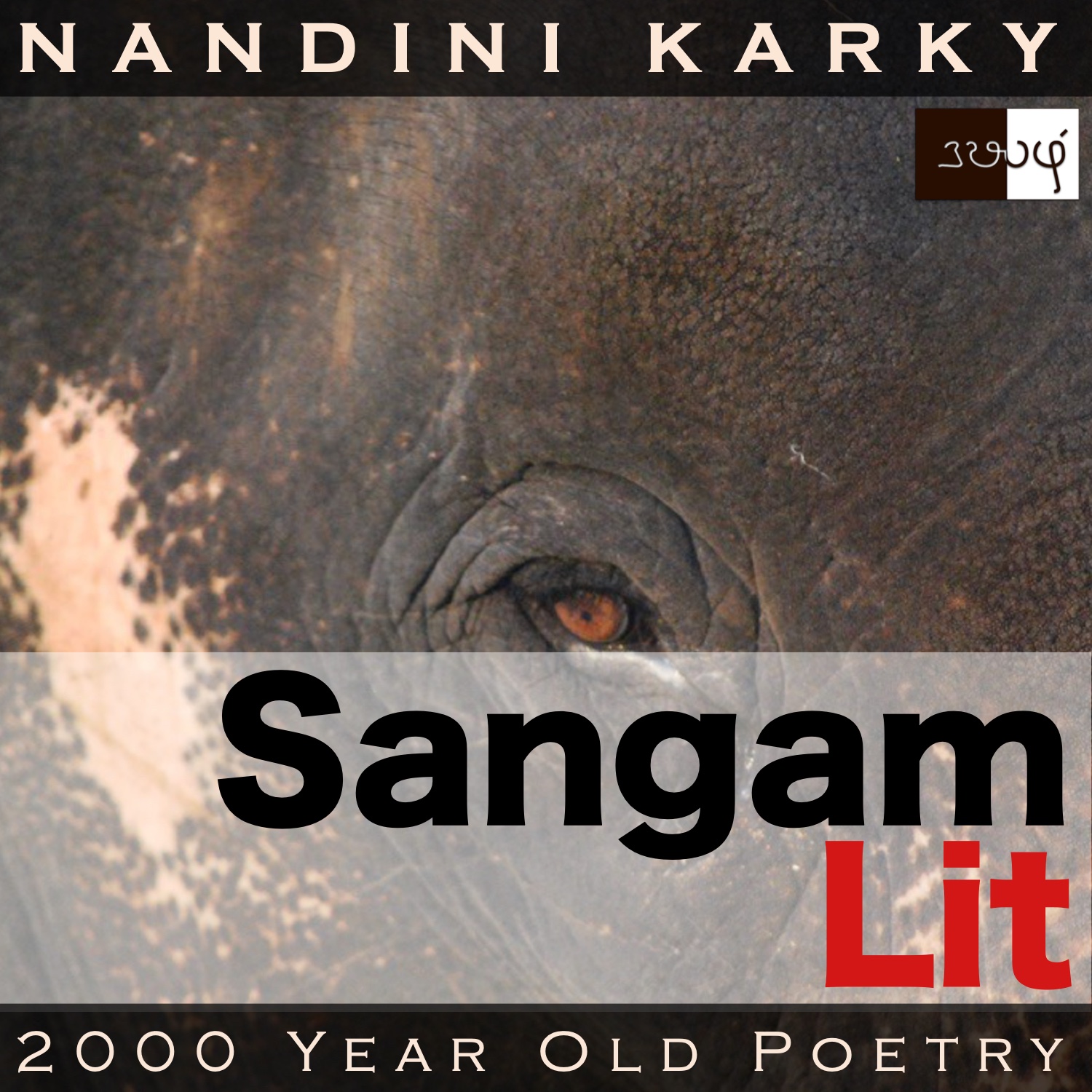Podcast: Play in new window | Download
Subscribe: Apple Podcasts | Spotify | Amazon Music | Android | iHeartRadio | TuneIn | RSS | More

In this episode, we understand the cultural beliefs depicted in Sangam Literary work, Natrinai 65, written by Kabilar. Set in the mountain landscape of ‘Kurinji’, the poem speaks in the voice of the lady’s confidante to the lady, giving the lady hope in her moment of pain.
அமுதம் உண்க, நம் அயல் இலாட்டி
கிடங்கில் அன்ன இட்டுக் கரைக் கான் யாற்றுக்
கலங்கும் பாசி நீர் அலைக் கலாவ,
ஒளிறு வெள் அருவி ஒண் துறை மடுத்து,
புலியொடு பொருத புண் கூர் யானை
நற் கோடு நயந்த அன்பு இல் கானவர்
விற் சுழிப்பட்ட நாமப் பூசல்
உருமிடைக் கடி இடி கரையும்
பெரு மலை நாடனை ‘வரூஉம்’ என்றோளே.
A short but delightfully sweet poem, opening with the delicious ‘அமுதம் உண்க’ meaning ‘eat ambrosia’ and without much ado, introduces us to the good-natured ‘next-door girl’ in ‘அயல் இலாட்டி’. The song sings with alliterations almost in every other line with ‘அமுதம் – அயல்’, ‘கலங்கும் – கலாவ’, ‘புலியொடு – புண் கூர்’ and ‘நற்கோடு – நயந்த’. While alliterations abound in the beginning, as the poem soars to a climax, it turns to second-letter rhymes such as ‘நற்கோடு – விற்சுழி’, ‘உருமிடை – பெரு மலை’ and resounds like thunder against our hearts with ‘கடி இடி’! There’s a friendly neighbourhood girl, a tiger, an elephant and forest dwellers in action and dialogue in this terse verse.
Seeing beyond first glances, we understand the lady is in pain as the man has left in search of wealth to seek her hand in marriage. He has not returned in the time he promised he would. As the lady languishes in her pining for him, the lady’s confidante one day runs to her and says, “Let her drink the elixir of life, our dear next-door girl! Through embankments like that of a deep trench, courses a wild forest river, dispersing the standing moss and descends as a white waterfall that echoes all around. Hiding behind the falling cascade, a tiger pounces on an elephant. The elephant puts up a brave fight and defeats the tiger but is covered in wounds of this valorous battle. Desiring the tusks of this brave elephant, those forest dwellers, devoid of kindness, shower their arrows on the tusker. Hurt by those flying arrows, the elephant trumpets in pain that sounds like thunder slashing the mountains. Such mountains are the land of our lord. Our dear neighbour should drink that elixir and live long for she said ‘He would come!’”
Worry not if the deeper meanings do not present themselves immediately. As we always do, let’s delve deeper into the outer images and inner beliefs that are splashed in this song. The next-door girl should live a long life by drinking the elixir of life. But why? Let’s hold on to that question a little longer and focus on the description of the mountain country. This plays out like an action packed sequence in the mountains. First scene opens with water gushing through a narrow but deep channel, akin to that of a fort’s trench. The rains must have poured and rivulets must have made the stream fierce and forceful. A little further, the moss that has spread in stagnant water is unaware of what’s about to attack it. In a moment, the rushing water pounces and scatters that stagnant moss. Not stopping to gloat over its feat, the water rushes and pours down the hill as a cascade. The focus lifts from the gushing river, flowing down as a waterfall, to the tiger hiding behind it. An elephant comes to savour the fresh water from the cascade, only to be attacked by the tiger. A battle follows and the elephant emerges victorious but is covered in blood and wound. If you thought the tiger was cruel to pounce on that unsuspecting elephant, even worse stand the forest dwellers. For they think the tusk of an elephant strong enough to fell a tiger must be worth much and seeking that, they aim their arrows at the poor, wounded elephant and all we are left hearing is the sound of that elephant trumpeting in pain. We leave the scene with those echoes resounding in our ears like thunder claps on the backs of mountains.
Such a vivid scene of life in the mountain forest has unfolded before our eyes. Not a mere documentary, this! This outer life is inextricably connected to the inner life of the lady. She’s the wounded elephant, pining for her man who has parted from her. Those unkind, attacking forest dwellers are the townspeople who nock their tongues in gossip and send rumours about the lady’s languishing health, wounding her further. The poem hints that the man of the mountains could perhaps hear the inner trumpeting of this wounded elephant back home. And how does the neighbourhood girl figure in this whole scenario? She’s the blessed one for when the confidante was sitting worried thinking about the man’s absence, she heard the girl far-away, talking to someone else, and saying the words ‘He would come’. That’s the sign, the good omen, the lady’s confidante believes will bring the man back to the arms of the lady, like that gushing water dispelling the moss of gossip. True testimony to the power of a positive word in wiping the tears of a wounded one, be it then or now or forever!




Share your thoughts...